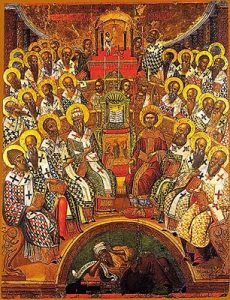 Since the Council of Nicaea I is the foundational Council of the Christian Church, I thought that I would take this opportunity to provide information about the actions of the Council.
Since the Council of Nicaea I is the foundational Council of the Christian Church, I thought that I would take this opportunity to provide information about the actions of the Council.
Doctrinal issues were the Council’s first concern. Arian-minded bishops proposed a formula of faith (contents not extant) that was indignantly rejected by the vast majority. Then Eusebius of Caesarea proposed the baptismal creed of his own Church, the oldest eastern creed now know. Its orthodoxy gained it general approval, but a majority of the bishops insisted on certain additions that would counter the Arian errors more clearly and explicitly. The first directly contradicted the Arian affirmation that the Son, not genuinely begotten, did not proceed from the very essence, or nature, of the Father, but only by the Father’s will, like other creatures. The second addition confronted Arius’ statement that the Son is not so by nature, but is “made” by the Father. The third addition comprised the most significant word of the creed, the sword of division for decades after the Council.
Not a biblical word, homoousios appears for the first time in Gnostic literature. Since in strict generation the son has the same nature as his father. The Arians denied this of the Word with understandable logic because they denied His generation. The use of this Greek work affirms that the Word is God as the Father is God, and this because He is the Father’s true son. And if this affirmation is linked with the first article of the creed, “on God Father,” it is clear that the Nicene Creed proclaims numerical identity of the Father’s nature and the Son’s. The creed does no more than mention the Third Person, for the divinity of the Spirit was not at issue.
The Nicene Creed was the first dogmatic definition of the Christian Church and through the ages has served as a test of orthodoxy. Almost all of the expressions used in the creed are scriptural, with the addition of certain words that are philosophical in origin. Indeed the meaning of Scripture is made clear in the light of tradition. The Son’s divinity in its strict sense is defined.
Recall that this Council was held in 325 CE. There was still not a clear idea of the Trinity since the idea of Who Jesus Is was still being debated. The idea of God being “Father” came from the fact that Jesus referred to Him as Father – “Abba.”
